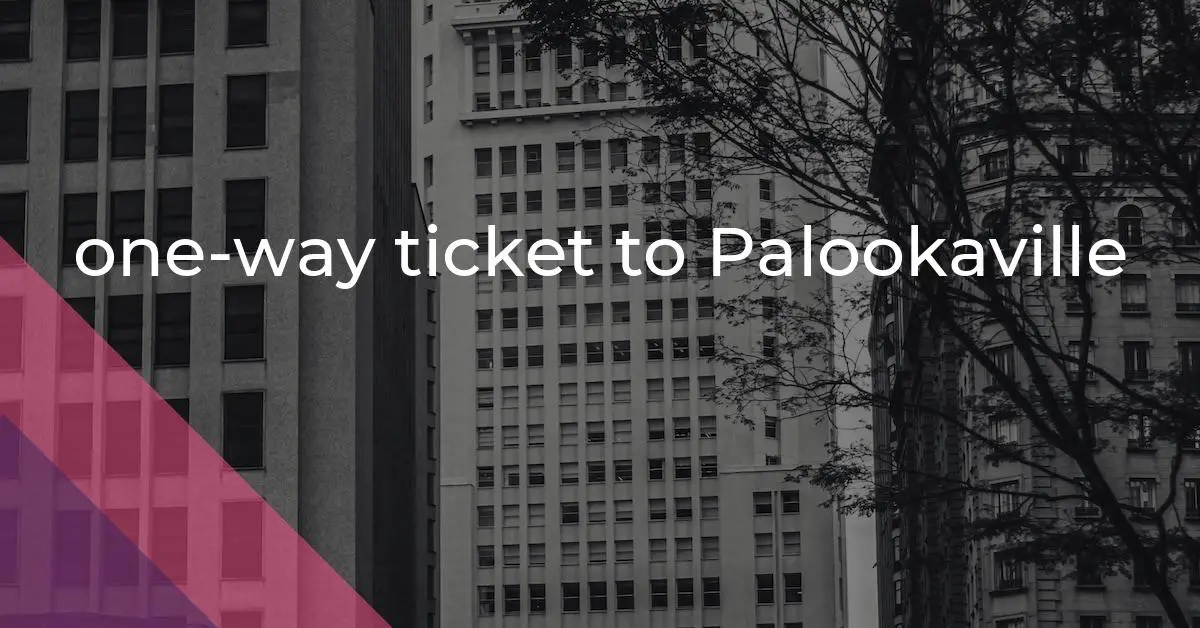one-way ticket to Palookaville: Idiom Meaning and Origin
What does ‘one-way ticket to Palookaville’ mean?
An "one-way ticket to Palookaville" means a definite path to failure or a situation where there is no hope for success or improvement.

Idiom Explorer
When there is "trouble in paradise," it means that there are problems or conflicts in a situation or relationship that was once perfect or ideal.
The idiom "pave the road to hell" means that even though someone may have good intentions, their actions or decisions can ultimately lead to negative consequences or harm.
The idiom "only game in town" means that there's only one option or choice available, typically in a particular situation or context.
"One-trick pony" refers to someone or something that is only skilled or proficient in doing one thing, making them limited or one-dimensional in their abilities or talents.
The idiom "one step forward, two steps back" means to make progress in a certain situation, only to lose that progress and end up in a worse position than before. It refers to a setback or obstacle that hinders progress and is often used to express frustration or disappointment.
The idiom "one of those things" refers to a situation or event that is out of one's control, often unexpected or difficult to explain or understand.
The idiom "one-horse town" refers to a small and unimportant place, typically lacking excitement or opportunities. It conveys a sense of boredom, insignificance, and limited resources within the town.
The idiom "on a losing wicket" means being in a situation where success is unlikely or the odds are against you.
The idiom "oh well" is used to express resignation or acceptance of a situation that cannot be changed. It conveys a sense of letting go and moving on from disappointment or frustration.
When something or someone goes "off the rails," it means they have deviated from the normal or expected course of action. It suggests a loss of control or a situation becoming chaotic or out of hand.
The Fascinating Tale
The American idiom "one-way ticket to Palookaville" is an expression that has been used for decades to describe a situation or action that leads to failure, ruin, or obscurity. The phrase is often associated with a sense of hopelessness or irreversibility, suggesting that once someone sets foot on a particular path, there is no turning back.
The origin of this idiom can be traced back to the world of boxing in the early 20th century. During those times, boxing was a highly popular sport, and the term "Palooka" was commonly used to refer to a mediocre or unskilled boxer. The addition of "ville" to Palooka created the fictional place known as Palookaville, which represented a state or condition of defeat or mediocrity in the boxing world.
Over time, the idiom extended beyond the boxing ring and made its way into everyday language. It became a way to describe any situation in which an individual's actions or choices result in failure or a downward spiral. The use of the term "one-way ticket" further emphasizes the idea that once someone embarks on this path, there is no escape or opportunity for redemption.
This idiomatic expression has found its place in literature, films, and popular culture, solidifying its presence in the English language. It has been used in titles of books, songs, and movies to convey a sense of despair or the inevitability of a negative outcome.
In recent years, the usage of this idiom has declined somewhat, but it still holds strong significance. It continues to be employed to describe situations where there is a sense of permanence in the consequences or an overall feeling of resignation.
The related idiom "dead end" is similar in meaning to "one-way ticket to Palookaville." Just as the latter implies a path leading to failure or ruin, a "dead end" refers to a situation or direction that offers no potential for progress or success. Both idioms convey a sense of hopelessness and finality, highlighting that once you reach a "dead end" or set foot on the "one-way ticket to Palookaville," there is no turning back and no opportunity for improvement.
Similarly, the idiom "no go" resonates with the concept of a "one-way ticket to Palookaville." "No go" refers to a situation that is futile or impossible to achieve. It suggests that whatever action is being considered is not worth pursuing or will inevitably lead to failure. In this context, "no go" aligns with the idea that once someone embarks on the "one-way ticket to Palookaville," there is no hope for a positive outcome or a change in fortune.
Another related idiom is "pave the road to hell," which shares similarities with the concept of a "one-way ticket to Palookaville." "Pave the road to hell" means that a person's actions, although well-intentioned, can inadvertently lead to negative consequences. It implies that even though someone may have good intentions, their choices or actions can result in disastrous outcomes. This idiom mirrors the idea that once someone sets foot on the "one-way ticket to Palookaville," there is no escape from the negative outcomes that await them.
All in all, "one-way ticket to Palookaville" is an idiomatic expression deeply rooted in the world of boxing. It has come to symbolize a path leading to failure or ruin, carrying a sense of hopelessness and inevitability. Although its usage has decreased in recent years, it still remains a part of the English language, conveying a sense of permanence in the consequences of one's actions or choices.
Example usage
Examples of the idiom "one-way ticket to Palookaville" used in a sentence:
- After losing his job and gambling away all his money, he felt like he was on a one-way ticket to Palookaville.
- If you keep hanging out with those troublemakers, you're going to end up with a one-way ticket to Palookaville.
- She knew that if she didn't study for the exam, it would be a one-way ticket to Palookaville.
More "Slang" idioms



